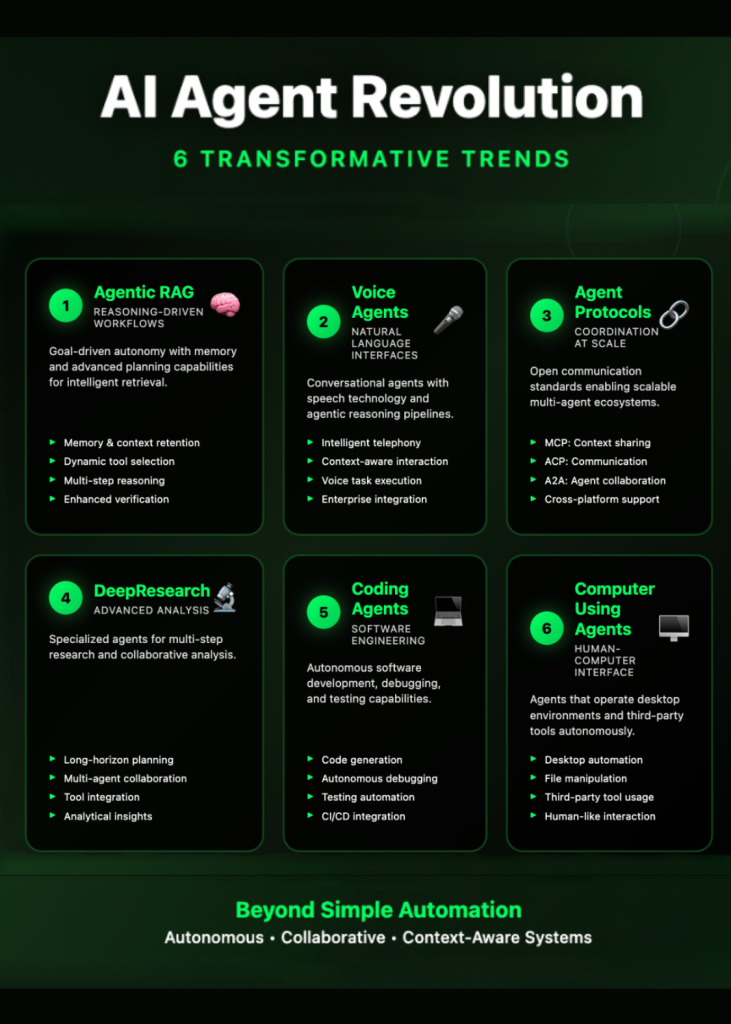The year 2025 marks a defining moment in the evolution of artificial intelligence, ushering in an era where agentic systems—autonomous AI agents capable of complex reasoning and coordinated action—are transforming enterprise workflows, research, software development, and day-to-day user experiences. This articles focuses on five core AI agent trends for 2025: Agentic RAG, Voice Agents, AI Agent Protocols, DeepResearch Agents, Coding Agents, and Computer Using Agents (CUA).
1. Agentic RAG: Reasoning-Driven AI Workflows
Agentic Retrieval-Augmented Generation (RAG) stands as the cornerstone use case in 2025 for real-world AI agents. Building on the standard RAG architecture, Agentic RAG introduces goal-driven autonomy, memory, and planning. Here’s how the agentic approach refines classical RAG:
- Memory & Context Retention: Agents track user queries across sessions, building short-term and long-term memory for seamless context management.
- Planning & Tool Use: Agents dynamically select retrieval strategies (vector DBs, APIs) and coordinate the right tool for the task.
- Multi-Step Reasoning: They orchestrate complex workflows—involving dynamic data fetching, prompt optimization, and leveraging diverse sources—before generating responses via LLMs.
- Accuracy and Adaptability: Enhanced post-generation verification and learning loop improve output quality and domain adaptability, creating systems that can synthesize and reason over vast data sets, not just retrieve answers.
Enterprise adoption of Agentic RAG is sweeping across sectors, powering smart assistants, search engines, and collaborative platforms that rely on multi-source data retrieval and reasoning.
2. Voice Agents: Natural Language Interfaces
Voice-controlled agents are reaching new heights, seamlessly blending speech-to-text (STT) and text-to-speech (TTS) technologies with agentic reasoning pipelines. These agents interact conversationally with users, retrieve data from diverse sources, and even execute tasks such as placing calls or managing calendars—all through spoken language.
- Intelligent Telephony: Agents can participate in live phone conversations, interpret natural queries, and deliver informed responses based on enterprise databases.
- Context-Aware Interaction: Deep integration with agentic workflows ensures voice agents adapt to context, understand intent, and use planning to fulfill spoken tasks beyond simple command-and-response.
3. AI Agent Protocols: Coordination at Scale
With the proliferation of multi-agent systems, open communication protocols are vital. The most prominent ones include:
- MCP (Model Context Protocol): Shares workflow states, tools, and memory across agents.
- ACP (Agent Communication Protocol): Enables reliable message exchange, workflow orchestration, context management, and observability.
- A2A (Agent-to-Agent Protocol): Facilitates seamless, decentralized collaboration and task delegation among agents—even across platform or vendor boundaries.
These protocols are rapidly adopted to enable scalable, interoperable, and secure agentic ecosystems in the enterprise—supporting everything from customer support to supply chain automation.
4. DeepResearch Agents: Advanced Collaborative Analysis
A new category of agents, DeepResearch Agents, is architected for tackling multi-step research problems. These AI systems aggregate and analyze vast swathes of structured and unstructured information from the web and databases, synthesizing analytical reports and actionable insights.
- Long-Horizon Planning: Capable of breaking down research tasks into sub-queries, aggregating results, and iteratively refining outputs with reasoned analysis.
- Multi-Agent Collaboration: Specialized agents—for citation, aggregation, verification—work together to generate thoroughly researched deliverables.
- Tool Integration: DeepResearch agents leverage APIs, browsers, code execution tools, and context protocols to drive high-depth reports at a speed impossible for human researchers.
Business, science, and finance sectors are rapidly integrating DeepResearch architecture, reshaping how teams approach knowledge-intensive work.
5. Coding Agents & CUA: Autonomous Software Engineering
Coding Agents are revolutionizing application development, debugging, and testing:
- Code Generation: Agents propose solutions, architect systems, and write code based on abstract queries or specifications.
- Autonomous Debugging: They diagnose issues, apply fixes, and even run test suites iteratively.
- Testing & Continuous Integration: Agents manage testing environments, execute test runners, and ensure code quality at scale.
CUA (Computer Using Agents) bridge the gap between human-computer interaction and autonomous interfaces. These agents operate desktop sandboxes, manipulate files and data, and use third-party tools—fully automating tasks as a human would.
The Bigger Picture: Autonomous, Collaborative, and Context-Aware AI
The AI agent revolution of 2025 is defined by several key themes:
- Autonomy: Agents plan and execute complex tasks with minimal human intervention.
- Collaboration: Robust protocols unlock federated, large-scale coordination between agents and platforms.
- Memory & Reasoning: Enhanced long-term memory and advanced reasoning deliver higher-quality, more relevant results.
- Accessibility: Low-code and no-code tools are democratizing agent development, enabling non-technical users to harness agentic AI.
With ongoing innovations, human oversight remains critical. As agents become more capable, establishing boundaries around agent autonomy—and ensuring transparency and safety—are vital for responsible adoption.


In Summary
2025’s agentic AI trends is not about single-purpose bots, but sophisticated, task-oriented systems capable of holistic reasoning, collaboration, and learning. These advances are redefining how we work, research, build, and interact with technology—fulfilling the vision set forth in the AI Agent Trends of 2025
Feel free to check out our GitHub Page for Tutorials, Codes and Notebooks. Also, feel free to follow us on Twitter and don’t forget to join our 100k+ ML SubReddit and Subscribe to our Newsletter.
Asif Razzaq is the CEO of Marktechpost Media Inc.. As a visionary entrepreneur and engineer, Asif is committed to harnessing the potential of Artificial Intelligence for social good. His most recent endeavor is the launch of an Artificial Intelligence Media Platform, Marktechpost, which stands out for its in-depth coverage of machine learning and deep learning news that is both technically sound and easily understandable by a wide audience. The platform boasts of over 2 million monthly views, illustrating its popularity among audiences.















Leave a comment